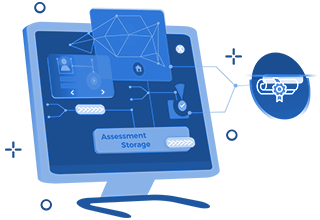Eleven key values and attitudes have been identified as essential for an academic credential assessor. These apply across all 27 key competencies and five functional groups.
1. Duty to the applicant
Assessors owe a duty of care to applicants. They must display a positive, helpful, and sensitive attitude to applicants, remembering that they may not have a good knowledge of Canada or its languages.
Assessors must constantly be aware that the result of their decisions will directly affect the lives of applicants, including their:
- residency status;
- ability to find meaningful employment;
- ability to support their families.
Assessors need to communicate with courtesy and sensitivity.
2. Duty to the Canadian jurisdictions
Assessors must not compromise:
- public health and safety; or
- the integrity of:
- the education systems; and
- professions and trades in the provinces and territories of Canada.
Assessors must reach:
- impartial
- fair
- transparent and
- defensible decisions about academic credentials.
3. Confidentiality
Assessors must:
- respect the confidentiality of individual applicants' personal information; and
- ensure that information about an individual is not disclosed to others, except:
- in specified circumstances; and
- with the informed consent of the individual.
4. Participation in continuous professional development
Assessors have a responsibility to:
- maintain competency in their field of practice; and, to this end,
- participate in continuous professional development throughout their working lives.
Practitioners will:
- keep their knowledge in their field of practice up to date; and
- extend their competencies as the demand for new services develops.
5. Independence and impartiality
Assessors should carry out their professional tasks without any form of discrimination based on:
- age;
- ancestry;
- colour;
- citizenship;
- disability;
- family status;
- gender;
- marital status;
- place of origin;
- political beliefs;
- religion;
- sexual orientation; or
- source of income.
Assessors have the right to exercise personal judgment in the context of their responsibilities after taking into account all relevant circumstances, without any application of external influence. Advice and decisions should be given impartially and objectively, without:
- pressure from external sources; and
- conflicts of interest.
6. Honesty and integrity
Assessors are required to act with honesty and integrity in their relationships with clients and others, including professional colleagues, and must not engage in any activity or behaviour that would be likely to bring their organization or profession into disrepute or undermine public confidence in the profession.
7. Supervision of support staff
Assessors who supervise others are required to ensure that any member of their team to whom a task is delegated has the competency (attitudes, knowledge, and skills) necessary to undertake that task effectively and efficiently.
Assessors should always provide appropriate supervision and support. The responsibility for a delegated task remains with the delegator.
8. Compliance with codes of conduct and practice
Assessors must comply with the provisions of:
- relevant legislation; and
- codes of practice and standards relating to the professional services they provide.
9. Professional indemnity insurance
Self-employed assessors* have an obligation to carry professional indemnity insurance at a level sufficient to ensure the client will be adequately compensated in the event of a justified claim arising as a result of the provision of their services.
*Assessors who are not self-employed are expected to be covered by their organization's insurance.
10. Conflicts with moral or religious beliefs
In the event of conflicts with moral or religious beliefs arising from a request for the provision of an academic credential assessment, members of the profession have an obligation to provide information on where that service can most conveniently be obtained from a professional colleague.
After agreeing to provide a service, assessors are bound to set aside any:
- personal;
- religious;
- political;
- philosophical; or
- other convictions.
11. Environment and sustainability
Assessors should be aware of environmental issues; their actions should not lead to needless waste of:
- energy;
- time; or
- other resources.
You may get more information about the competency profile for an academic credential assessor to learn how it was developed and its content.
 English
English Français
Français 日本語
日本語 中文
中文 한국어
한국어 Русский
Русский










